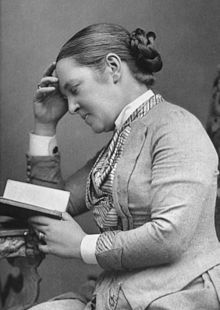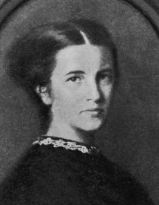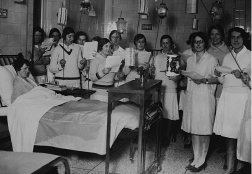 |
| (http://www.notablebiographies.com/A-An/Anderson-El ()) |
As a champion of women's education and professional life in Britain, Elizabeth Garrett Anderson embodies exactly that. Garrett was the first qualified female physician in Britain and, through her determination and bravery, paved the way for women's education in medicine. She was born in 1836 as the second of ten children to a successful businessman and his wife. Her father ensured that all of his daughters received quality education, which helped foster Garrett's lifelong interest in learning. Despite the criticism she received, she decided to pursue her passion for medicine. Although she excelled and was at the top in the class, several medical schools rejected her due to her gender. This drove her to take her education into her own hands and pave her own path to success. Since Britain did not permit her to earn a degree, she decided to move to France so she could earn it there. When she returned to Britain, Garrett founded New Hospital for Women in London, which was staffed entirely by women. Later, Garrett continued to encourage women to go into medicine and helped found the London Medical College for Women, where she taught for several years. She later retired to Aldeburgh and made history by becoming the first female mayor in Britain. After a successful life, she passed away at age 81 in Suffolk. Garrett's character traits that helped her achieve several accomplishments throughout her life resemble those of a hero; she is courageous, determined, and has a strong sense of purpose. These traits enable a hero to make a difference in the world and change many people's lives. Elizabeth Garrett Anderson is a hero because of her determination to obtain a medical degree, her courage in pursuing a career in a field dominated by men, and because she made a positive change in the world that opened up opportunities for many others.
 |
| (http://www.snapeprimaryschool.com/curriculum.html ()) |
Elizabeth Garrett Anderson was determined to accomplish her goals and was willing to combat any obstacles that halted her efforts, which speaks to her heroic nature. In the earliest phases of her education, she immediately faced several hardships, but she nevertheless found a way to prosper: "She remained determined to obtain a medical degree, so she taught herself French and went to the University of Paris, where she successfully earned her degree" (BBC). Despite the hostility she faced at the medical college in Britain, she was determined to succeed and earn a degree. She taught herself French so that she could study in France, proving how determined she was to execute her plan and attain her medical license. It would have been easy for her to give up and remain unemployed like most other women, but she was persistent in earning her degree and practicing medicine, so she studied hard and did not quit until she felt accomplished. In that day and age, a woman aspiring to be a doctor was an unprecedented endeavor, so when Garrett set out to pursue her degree, she faced heavy discrimination and criticism: "Garrett tried to study in several medical schools but they all refused to accept a woman student. Garrett therefore became a nurse at Middlesex Hospital and attended lectures that were provided for the male doctors" (Simkin). The bitter, discouraging behavior from fellow male aspiring physicians did not stop her from pursuing her goals. Her determination and perseverance helped her overcome struggles, find opportunities, and achieve her goals. Garrett continuously approached walls that prevented her from pursuing her dream, yet always found a way to climb over and continue on her path to success.
Garrett was brave and courageous in pursuing her career in medicine and she undertook tasks that others were too afraid to. Garrett wanted to break the barrier that separated women from pursuing a medical career and was not afraid to be the first woman to do so: "Nowhere in Europe was the woman who wished to study medicine so stubbornly opposed as in Britain." (Elizabeth Garrett Anderson). The thought of a woman becoming a physician was heavily opposed in Britain at the time; it was an unprecedented feat for a woman to obtain a medical degree and nobody was brave enough to be the first, until Elizabeth Garrett Anderson came along. She was courageous in putting herself forward and was not deterred by the hostility and rejection she constantly faced. Once she decided that she wanted to become a doctor, she had to bravely attend classes that were solely comprised of men who were unwelcoming and hostile towards her: "She enrolled as a nursing student at Middlesex Hospital and attended classes intended for male doctors, but was barred after complaints from other students. As the Society of Apothecaries did not specifically forbid women from taking their examinations, in 1865 she passed their exams and gained a certificate which enabled her to become a doctor" (BBC). Although the classes at the hospital were intended for male doctors, Garrett was not intimidated and she courageously attended the classes and excelled. After the school removed her due to complaints from the male students, she still did not give up and continued to fight for her right to become a physician. Her aspirations were not subdued and she bravely put herself out there in a society where employed women were looked down upon, just so that she could earn a degree. It takes a lot of courage to pursue a career when being the minority and peers are unwelcoming, yet Garrett was unafraid to take on a challenge and did not feel defeated when she encountered something that stood in the way of her success.
 |
| (http://www.gettyimages.co.uk/photos/elizabeth-garr ()) |
The major reason as to why Elizabeth Garrett Anderson should be considered a hero is that she made a positive difference in the world that opened up opportunities for thousands of women. At the time in Britain, married women were expected to be unemployed and do household chores; Garrett, however, changed that paradigm by opening a hospital and employing hundreds of women: "In 1872, Anderson founded the New Hospital for Women in London (later renamed after its founder), staffed entirely by women" (BBC). After obtaining her medical degree, Garrett wanted all women to be able to recognize and fulfill their potential, so she decided to open a hospital staffed entirely by women. She made a positive impact in the lives of many and brought them closer to achieving their goals of becoming licensed physicians. In addition to inspiring other women to seek a career in medicine, she also had an influential role in politics: "Elizabeth also supported the suffragettes. In 1902 she and her husband retired to Aldeburgh, where she became mayor in 1908, the first woman mayor in Britain" (Cavendish). Her pivotal role in supporting women in the medical field changed the lives of many, as did her role as the first female mayor. She showed other people that women were highly capable of serving in a powerful position, giving other women the courage to put themselves forward in the male-dominated political world. Garrett set a precedent for subsequent generations of women and showed them that they were entirely capable of working in any position they desired.
Through her determination and courage, Elizabeth Garrett Anderson was able to achieve the unthinkable and paved the way for women in the medical and political fields, thereby making a positive change in the world. She faced heavy prejudice throughout her long journey to obtaining a medical degree, yet she stood strong and was not discouraged. Her determination and perseverance helped her overcome the hostility from her classmates and kept her on track to achieving her goal of becoming the first female doctor in Britain. Garrett's undeniable courage and bravery propelled her forward in her studies and enabled her to grab any opportunity that came her way. Her heroic qualities made her a pioneer in the medical and political fields and helped her pave the way for female professional life. She refused to be oppressed by social norms and pursued her dream of becoming a physician. This inspired other women to break barriers and showed them that they can accomplish their dreams and did not need to be held back by what society's expectations for women. Because of her bold and resilient actions, she has inspired women all over the world who have a dream that they want to make a reality. Her legacy has not only inspired people of her time, but has carried on to modern society and inspired people similar to you and me. Just like Elizabeth Garrett Anderson, I too have a goal of becoming a physician or surgeon. Although women make up a fair percentage of doctors today, gender stereotypes are still widely present and women still face prejudice in different forms. Garrett's courage and determination inspires me to withstand any prejudice I may face throughout my studies and medical career and not succumb to supposed male superiority. She inspires me to stand my ground and to always find a way around obstacles that inhibit my success. Garrett also inspires me to positively impact the world to the best of my abilities. Although becoming a surgeon may be a personal goal of mine, the reason behind it should be for the greater good, which is what Garrett stood for. By becoming a surgeon, I will save hundreds of lives and provide the best patient care possible, thereby contributing to something larger than myself. Elizabeth Garrett Anderson has significantly impacted thousands of women's lives and therefore gave her life to something bigger than herself, which is the paramount accomplishment a hero can achieve.
Priyanka Babu
Mrs. Thompson
HHSE 2: Period 5
16 May 2017
Works Cited
"BBC - History - Elizabeth Garrett Anderson." BBC News, BBC,
www.bbc.co.uk/history/historic_figures/garrett_anderson_elizabeth.shtml. Accessed 1
May 2017.
Cavendish, Richard. "Britain's First Female Doctor." Britain's First Female Doctor | History
Today, History Today, 9 Sept. 2015, www.historytoday.com/richard-cavendish/britain%E2%80%99s-first-female-doctor. Accessed 2 May 2017.
"Elizabeth Garrett Anderson." Historic World Leaders, edited by Anne Commire, Gale, 1994.
Biography in Context,
link.galegroup.com/apps/doc/K1616000062/BIC1?u=powa9245&xid=004fd747. Accessed 1 May 2017.
"Joseph Campbell Quotes." BrainyQuote, Xplore,
www.brainyquote.com/quotes/quotes/j/josephcamp138795.html. Accessed 14 May 2017.
Simkin, John. "Elizabeth Garrett Anderson." Spartacus Educational, Spartacus Educational,
spartacus-educational.com/WandersonE.htm. Accessed 3 May 2017.
Page created on 5/27/2017 12:00:00 AM
Last edited 5/27/2017 12:00:00 AM
